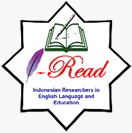The effectiveness of the combination of podcast and two stay two stray in teaching listening
DOI:
https://doi.org/10.22219/englie.v5i2.34830Keywords:
English Podcast, Teaching Listening, Two Stay Two StrayAbstract
This study aims to find out the effectiveness of the combination of Podcast and Two Stay Two Stray in teaching listening. The true experimental design with a pretest-posttest control group design was used in this study. The research population consisted of eleventh grade students from SMAN 1 Tahunan. The research sample consisted of classes XI-6 and XI-11, where XI-6 was assigned as the control group whereas XI-11 as the experimental group. It was chosen using a straightforward random sampling method. The instrument used by researchers to assess students' listening skills was providing 25 multiple-choice listening questions. The results demonstrated that the mean scores for both groups before and after the exam differed significantly. Furthermore, the analysis results utilizing the independent sample t-test showed that the t-test score (14.72>1.695) was higher than the t-table score. It indicates that the alternative hypothesis was accepted. Referring of the study’s findings, it can be concluded that the combination of Podcast and Two Stay Two Stray can improve students’ listening skill.
Downloads
References
Ambubuyog, E. M. I., Laumoc, G. L. C., Mantac, F. H. A., Pagulayan, F. M. C., Sayson, C. J. E. C., Velasco, A. C. M., & Biray, E. T. (2023). Active listening: Its impact on language learning and understanding of education students. International Journal of Multidisciplinary: Applied Business and Education Research, 4(2), Article 2. https://doi.org/10.11594/ijmaber.04.02.33
Amumpuni, R. S. (2016). The implementation of podcast in teaching listening at the first semester students of IKIP PGRI Madiun. Jurnal Edutama, 3(1), 63-68. http://dx.doi.org/10.30734/jpe.v3i1.31
Banani, D. S. A. (2012). The need of listening comprehension in the teacher training programme in the faculty of education, Hodeidah University. Journal of the College of Basic Education, 18(74), 57–62. https://doi.org/10.35950/cbej.v18i74.8657
Carrillo, N. M. R., Labre, M. G. P., & Valle, V. V. Y. (2019). The effects of cooperative learning on reading comprehension. Explorador Digital, 3(3.1), Article 3.1. https://doi.org/10.33262/exploradordigital.v3i3.1.875
Dike, D., Parida, L., Stevanus, I., (2021). Strategi mikro kepala sekolah membudayakan budaya malu sebagai nilai karakter unggul sekolah dasar di Kabupaten Sintang. Xox Edukasi Jurnal Ilmiah Ilmu Pendidikan, 12(1), 14-27. https://doi.org/10.31932/ve.v12i1.916
Diora, L., & Rosa, R. N. (2020). An analysis of students’ difficulties in listening comprehension: A descriptive study at english language and literature department FBS UNP. Journal of English Language Teaching, 9(1), 85. https://doi.org/10.24036/jelt.v9i1.107957
Djabborova, F. O. (2020). Ways of developing listening skills of english learners in ESL and EFL classroom. European Journal of Research and Reflection in Educational Sciences, 8(10), 212–216.
Dutta, S., Woodring, J., Shen, H. W., Chen, J. P., & Ahrens, J. (2017). Homogeneity guided probabilistic data summaries for analysis and visualization of large-scale data sets. IEEE Pacific Visualization Symposium, 111–120. https://doi.org/10.1109/PACIFICVIS.2017.8031585
Erliana, S., Miftah, M.Z. (2014). The multifaceted dimensions of English linguistics, literature and education literature and education. In ELITE (English Linguistics, Literature and Education).
Gilakjani, A. P., & Sabouri, N. B. (2016). Learners’ listening comprehension difficulties in english language learning: A literature review. English Language Teaching, 9(6), 123. https://doi.org/10.5539/elt.v9n6p123
Gultom, Q. Z., Utari, P., & Rahmawati, W. T. (2023). The importance and difficulties of listening skill: A description. Excellence: Journal of English and English Education, 3(1), Article 1. https://doi.org/10.47662/ejeee.v3i1.584
Khanna, P. (2020). Techniques and strategies to develop active listening skills: The armour for effective communication across business organizations. Journal of English Language, Literature and Culture, 6(3), 50–60.
Khatun, N. (2021). Applications of normality test in statistical analysis. Open Journal of Statistics, 11(01), 113–122. https://doi.org/10.4236/ojs.2021.111006
Kurniawati, D. (2016). The essence of classroom technique and activities in teaching listening as a foundation skill for other skills in the early acquisition of language. English Education: Jurnal Tadris Bahasa Inggris, 9(1), 29–42.
Lendeon, G. R., & Poluakan, C. (2022). Pengaruh model Problem-Based Learning (PBL) terhadap kemampuan literasi sains siswa. SCIENING: Science Learning Journal, 3(1), 14–21. https://doi.org/10.53682/slj.v3i1.1076
Li, Y. W. (2016). Transforming conventional teaching classroom to learner-centred teaching classroom using multimedia-mediated learning module. International Journal of Information and Education Technology, 6(2), 105–112. https://doi.org/10.7763/ijiet.2016.v6.667
Listiyaningsih, T. (2017). The influence of listening English song to improve listening skill in listening class. Journal of Multidisciplinary Studies, 1(1).
Marzona, Y. (2023). An analysis of students’ difficulties in listening comprehension at english education department in faculty of teacher training and education of universitas ekasakti. Jurnal Ilmiah Pendidikan Scholastic, 7(2), Article 2. https://doi.org/10.36057/jips.v7i2.598
Nair, S. M., Yusof, N. M., & Hong, S. C. (2014). Comparing the effects of the story telling method and the conventional method on the interest, motivation and achievement of chinese primary school pupils. Procedia - Social and Behavioral Sciences, 116, 3989–3995. https://doi.org/10.1016/j.sbspro.2014.01.878
Ngwoke, F. U., Ugwuagbo, W., & Nwokolo, B. O. (2022). Refocusing on listening skills and note-taking: imperative skills for university students’ learning in an l2 environment. Theory and Practice in Language Studies, 12(7), Article 7. https://doi.org/10.17507/tpls.1207.01
Noor, S., & Tajik, O. (2011). Simple random sampling. Sampling of Populations: Methods and Applications: Fourth Edition, 1(November), 43–81. https://doi.org/10.1002/9780470374597.ch3
Ramadani. (2019). The Effect of Two Stay Two Stray Strategy on Students’ Listening Comprehension. 2(3), 1–14.Unpublished Undergraduate Thesis. http://repository.umsu.ac.id/bitstream/handle/123456789/4166/SKRIPSI.pdf?sequence=1&isAllowed=y
Ramli. (2018). The use of podcast to improve students" listening and speaking skillsfor efl learners. Proceedings of the International Conference on English Language Teaching (ICONELT 2017). https://doi.org/10.2991/iconelt-17.2018.42
Rime, J., Pike, C., & Collins, T. (2022). What is a podcast? Considering innovations in podcasting through the six-tensions framework. Convergence, 28(5), 1260–1282. https://doi.org/10.1177/13548565221104444
Rosalia, S., & Candraloka, O. R. (2023). The Effect of using think pair share to improve students’ reading skills. J-SHMIC : Journal of English for Academic, 10(2), 155–165. https://doi.org/10.25299/jshmic.2023.vol10(2).13544
Sabrina, G., & Rizka, B. (2020). The implementation of two stay two stray technique to improve the students’ competence of smp negeri 9 banda aceh in mastering reading comprehension 1. Journal of English Teaching and Linguistics, 1(2).
Samad, I. A., Bustari, A., & Ahmad, D. (2017). The use of podcasts in improving students’ speaking skill. Journal of English Language and Education, 3(2), 97-111. https://doi.org/10.26486/jele.v3i2.256
Sari, N. (2024). Improving learning independence of elementary students through the two stay two stray method. JCD : Journal of Childhood Devlopment Improving Learning Independence of Elementary Students through the Two Stay Two Stray Method. 4(1), 145–153. https://doi.org/10.25217/jcd.v4i1.3970
Silalahi, T.F., & Hutauruk, A.F. (2020). The application of cooperative learning model during online learning in the pandemic period. Budapest International Research and Critics Institute-Journal (BIRCI-Journal),3(3), 1683-1691. https://doi.org/10.33258/birci.v3i3.1100
Sudarmoyo, S. (2020). Podcast sebagai alternatif media pembelajaran jarak jauh. Edudikara: Jurnal Pendidikan Dan Pembelajaran, 5(2), 65–73. https://doi.org/10.32585/edudikara.v5i2.212
Supendra, D., Kusumastuti, G., Maiziani, F., & Rahmayanti, E. (2022). The practicality test of audio-based podcast media for online learning. SPEKTRUM: Jurnal Pendidikan Luar Sekolah (PLS), 10(2), 299. https://doi.org/10.24036/spektrumpls.v10i2.116977
Tobin, S. J., & Guadagno, R. E. (2022). Why people listen: Motivations and outcomes of podcast listening. PLoS ONE, 17(4 April 2022), 1–16. https://doi.org/10.1371/journal.pone.0265806
Triwardani, H.R., Rinaepi, R., Mubarokah, P.S. (2021). The effectiveness of podcast to improve listening skill in narrative text. Jurnal Fakultas Keguruan & Ilmu Pendidikan, 2(3).
Wulandari, T., & Sya'ya, N. (2021). The effectiveness of students’ listening skill by using podcast at the second grade of SMK Negeri 6 Balikpapan. Borneo Journal of Language and Education, (1(1), 25-38. https://doi.org/10.21093/benjole.v1i1.3134
Xu, M., Fralick, D., Zheng, J. Z., Wang, B., Tu, X. M., & Feng, C. (2017). The differences and similarities between two-sample t-test and paired t-test. Shanghai Archives of Psychiatry, 29(3), 184–188. https://doi.org/10.11919/j.issn.1002-0829.217070
Yoestara, M., & Putri, Z. (2019). PODCAST: An alternative way to improve EFL students’ listening and speaking performance. Englisia Journal, 6(1), 15. https://doi.org/10.22373/ej.v6i1.3805
Downloads
Published
How to Cite
Issue
Section
License
Copyright (c) 2024 Tifani Diah Nisa, Olyvia Revalita Candraloka

This work is licensed under a Creative Commons Attribution-ShareAlike 4.0 International License.
Authors who publish with English Learning Innovation (englie) agree to the following terms:
- For all articles published in English Learning Innovation (englie), copyright is retained by the authors. Authors give permission to the publisher to announce the work with conditions. When the manuscript is accepted for publication, the authors agree to automatic transfer of the publishing right to the publisher.
- Authors retain copyright and grant the journal right of first publication with the work simultaneously licensed under a Creative Commons Attribution-ShareAlike 4.0 International License that allows others to share the work with an acknowledgement of the work's authorship and initial publication in this journal.
- Authors are able to enter into separate, additional contractual arrangements for the non-exclusive distribution of the journal's published version of the work (e.g., post it to an institutional repository or publish it in a book), with an acknowledgment of its initial publication in this journal.
- Authors are permitted and encouraged to post their work online (e.g., in institutional repositories or on their website) prior to and during the submission process, as it can lead to productive exchanges, as well as earlier and greater citation of published work (See The Effect of Open Access).
This work is licensed under a Creative Commons Attribution-ShareAlike 4.0 International License.
















1.png)












